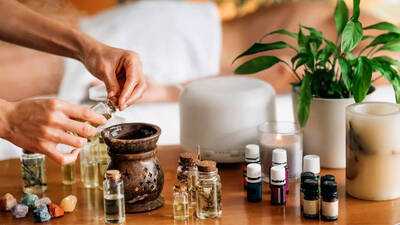DIY diffusers are all over social media pages. Influencers claim they are perfect for living rooms, bathrooms and bedside tables. These diffusers are becoming a popular way to enjoy essential oils or practice Aromatherapy. But a question lingers, does this ‘healing power’ of scent hold hidden risks? Although aromatherapy can be a wonderful tool for relaxation and self-care, and is generally considered safe, one must know it isn’t completely risk-free.
What is Aromatherapy?
As the name suggests, Aromatherapy is the use of scents for medicinal purposes. These scents are generally concentrated extracts from plants called ‘essential oils’. These scents are extracted from flowers, leaves, roots, seeds and so on. Aromatherapy is done by either breathing the scents or by topical application.

Some common essential oils for Aromatherapy are extracted from lavender, chamomile, sandalwood, citrus and rosemary. These scents have proven effects on stress relief, relaxation, better sleep and respiratory support. But these highly concentrated essential oils hold some potential risks as well.
How does Aromatherapy work and what are its effects?
When the healing scents are inhaled, tiny scent molecules travel through the nose to the olfactory system, which is directly connected to the brain’s limbic system. Since the limbic system regulates emotions, memory and hormones, Aromatherapy does its work and influences factors like mood, anxiety, and alertness.

Inhalation of essential oils is not always harmless
While diffusing oils can feel calming, their inhalation can affect breathing. The possible negative effects might cause headaches, dizziness and nausea. It is important to note that Aromatherapy directly deals with the lungs and ultimately the brain. Supervised use of these scents is recommended, especially if children are around, as they are more sensitive to airborne chemicals. The American Lung Association has pointed out some safety tips for the usage of essential oils. The report highlights, response can vary from person to person, a scent that works well for one can cause irritation to the other. Individuals with respiratory conditions should always be more careful with these scents.

Skin allergies and reactions are common
Essential oils are highly concentrated in nature. Direct application of these oils can cause skin related issues such as rashes, redness, irritation and itching. More severe reactions may even cause chemical burns. For this reason, people with sensitive skin or with certain skin conditions should only practice Aromatherapy after a professional prescription.
Disclaimer: This article is for informational purposes only. If an individual has respiratory issues, sensitive skin, or is pregnant, consulting with a medical professional should be strictly followed before starting Aromatherapy.
What is Aromatherapy?
As the name suggests, Aromatherapy is the use of scents for medicinal purposes. These scents are generally concentrated extracts from plants called ‘essential oils’. These scents are extracted from flowers, leaves, roots, seeds and so on. Aromatherapy is done by either breathing the scents or by topical application.
Some common essential oils for Aromatherapy are extracted from lavender, chamomile, sandalwood, citrus and rosemary. These scents have proven effects on stress relief, relaxation, better sleep and respiratory support. But these highly concentrated essential oils hold some potential risks as well.
How does Aromatherapy work and what are its effects?
When the healing scents are inhaled, tiny scent molecules travel through the nose to the olfactory system, which is directly connected to the brain’s limbic system. Since the limbic system regulates emotions, memory and hormones, Aromatherapy does its work and influences factors like mood, anxiety, and alertness.
Inhalation of essential oils is not always harmless
While diffusing oils can feel calming, their inhalation can affect breathing. The possible negative effects might cause headaches, dizziness and nausea. It is important to note that Aromatherapy directly deals with the lungs and ultimately the brain. Supervised use of these scents is recommended, especially if children are around, as they are more sensitive to airborne chemicals. The American Lung Association has pointed out some safety tips for the usage of essential oils. The report highlights, response can vary from person to person, a scent that works well for one can cause irritation to the other. Individuals with respiratory conditions should always be more careful with these scents.
Skin allergies and reactions are common
Essential oils are highly concentrated in nature. Direct application of these oils can cause skin related issues such as rashes, redness, irritation and itching. More severe reactions may even cause chemical burns. For this reason, people with sensitive skin or with certain skin conditions should only practice Aromatherapy after a professional prescription.
Disclaimer: This article is for informational purposes only. If an individual has respiratory issues, sensitive skin, or is pregnant, consulting with a medical professional should be strictly followed before starting Aromatherapy.
You may also like

'Like a slum': UK MP sparks outrage over comments on Birmingham area, dominated by Indians, Pakistanis

Mizoram varsity asks students, faculties to don handloom attire once a week

'The Project will be completed by 2028-2030': ISRO Director Nilesh M Desai on Mangalyaan 2

Congress MP alleges scam in Manipur under Jal Jeevan Mission, seeks court-monitored probe

"I was accused of theft, but punishment was for robbery": SP's Azam Khan






